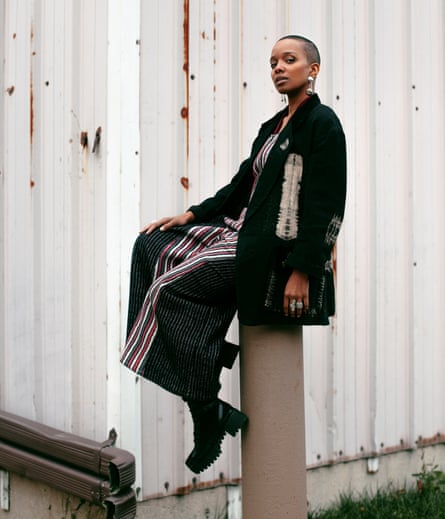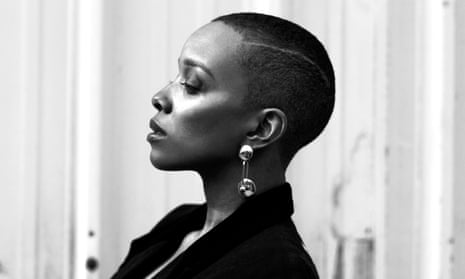Jamila Woods is a thoughtful soul. Not just in her music and poetry – with its emphasis on black ancestry and feminism – but in the way she acknowledges those that came before her, her native Chicago, and the young people there that she teaches. Part of a poetic and soulful local sound alongside Chance the Rapper and Noname (she’s worked with both), her mission is to champion forgotten voices in black art by building on the legacies they left behind. Woods is not just a poet, musician or youth worker but a beacon for self-empowerment in a city that gets a bad rep for violence.
We meet in the Tate Modern, and her face brightens when she refers to singer Betty Davis, poet Sonia Sanchez and other women she feels have guided her artistically and spiritually. Continuing the theme from BLK Girl Soldier, a song on her 2016 debut album where she pays homage to freedom-fighting women such as Assata Shakur and Rosa Parks, each song on her new album Legacy! Legacy! is named after a black luminary, such as Zora Neale Hurston, Octavia Butler or Sun Ra.
One song is dedicated to Eartha Kitt. “I was inspired by the way she thinks about love and relationships,” she says, namechecking a viral video where Eartha Kitt scoffs at the idea of compromising for anyone. “My inspirations gave me permission to speak up; the aim with my teaching is that it gives the young people of Chicago the same opportunity.”
Woods grew up in the quiet Chicago neighbourhood of Beverly Hills, an idyllic enclave in a city wracked with inequality. Her dad, a physician, and her mother, a spiritual healer, instilled in her the idea of working for the community; following private schooling and a degree from Brown University, Woods became associate artistic director of Young Chicago Authors, empowering kids to create their own narratives through hip-hop and poetry. She compares poetry to hip-hop’s tradition of sampling from across black musical history. “There’s a similar respect for lineage – you can say you’ve written a poem ‘after Maya Angelou’,” she says.
Woods describes a mentoring session where she had students draw lineage maps, using the people in their lives who had inspired them to find their own artistic voice. “It’s important for me to shout out those that came before, especially in a time where it’s about being individualistic or the first. That should be seen as a strength, because that’s what legacy is.”
Seeing Sonia Sanchez perform last year inspired Woods to bare even more of herself. “The track Sonia follows conversations I was having with friends about my own experiences,” she says. They discussed gaslighting and emotional manipulation in relationships. “I want to pass down the power to speak on how you should be treated.”

Legacy is now more important than ever in Chicago, which just elected its first black female mayor, the openly gay Lori Lightfoot, replacing the controversial Rahm Emanuel. It sounds like progress, but Woods isn’t convinced. “She’s been too close to all of the fuckery that happened during Emanuel’s administration and the cover-up of Laquan McDonald’s shooting,” she says, referring to the fatal shooting of the unarmed 17-year-old by former Chicago police officer Jason Van Dyke in 2014. Van Dyke was later found guilty of murder and sentenced to six years in prison; three other officers were found not guilty of trying to cover up the killing. Lightfoot headed a taskforce that found that the Chicago police were indeed prejudiced against the city’s black communities, but for Woods, there needs to be more than an independent review that declares what her community already knew: “To me she’s completely untrustworthy and she’s refused to be held accountable by the community.”
But, she says, “it’s an exciting time because there’s a higher sense of awareness to talk about the complexity of these issues. Now that I’m older I feel more plugged in. Post Laquan McDonald, I’ve found it easier to see through all of the rhetoric of Rahm Emanuel, which was harmful to the black communities here.” Last summer Emanuel, Obama’s former chief of staff, claimed that lack of “moral structure” within black and Hispanic communities was the cause for violent crime taking place in the city. “There’s violence happening throughout this city, not just gun and police violence, but in the closing of schools in the west and south side,” Woods says.
So what is Woods aiming to achieve with her championing of legacy? She wants to break the cycle of silence in families, particularly between grandmothers, mothers and daughters. “When I got to a certain age, conversations with my mom and grandmother changed and there was more honesty. That’s part of breaking the cycle because if I hadn’t have known what they’d experienced with men in their relationships, I wouldn’t be able to recognise that there’s a legacy in those stories. It can’t be an individual decision – there has to be a culture shift and a communal conversation.”
As Jamila Woods draws on the voices of her family, and those of Sanchez, Kitt and Hurston, soul becomes the thread that weaves them all together. “Soul doesn’t have to sound any one way,” she says. “It just has to hit you in the gut with its transformative power.”

Comments (…)
Sign in or create your Guardian account to join the discussion